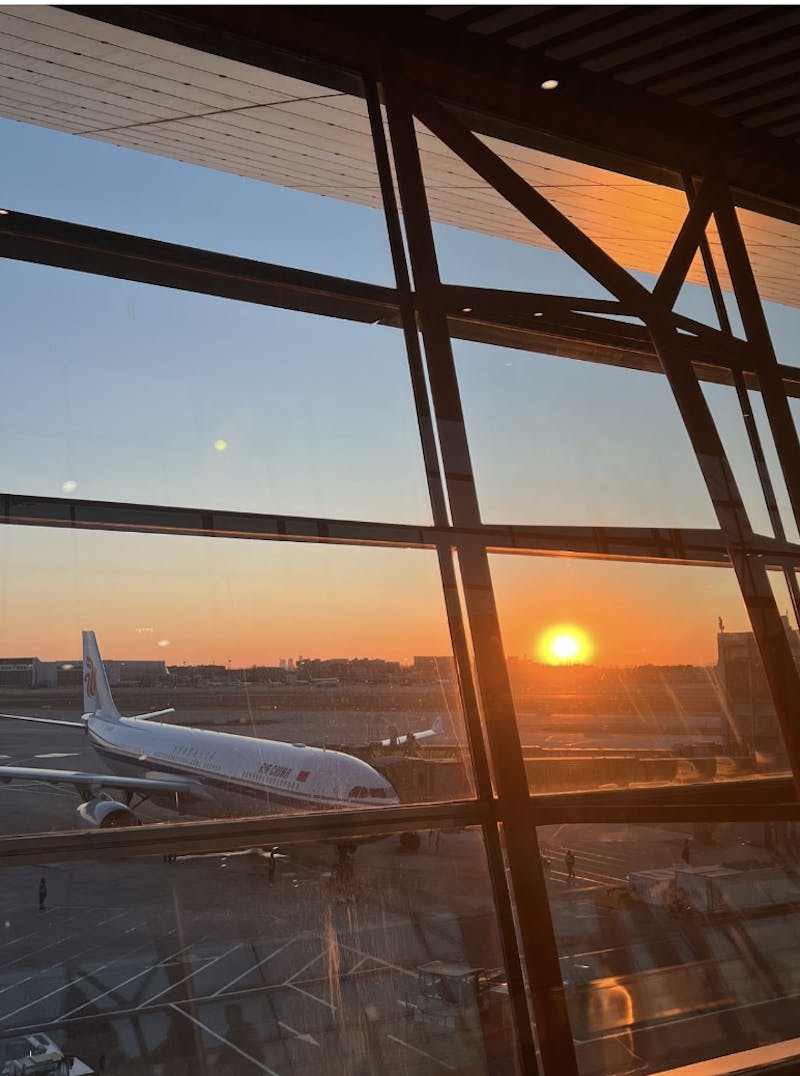
COURTESY OF VICKY LIN
Lin reflects on the many times she has left home for school and her motivations for studying in the U.S.

COURTESY OF VICKY LIN
Lin reflects on the many times she has left home for school and her motivations for studying in the U.S.
It’s been a good eight years since I first left China for high school in the US. All these years of going back and forth with fifteen-plus hours of flights, living with host families, Covid quarantines in both countries and college feel like a whirlwind, but I indeed lived through every second of it.
I have a hard time understanding why my fourteen-year-old self would decide to go abroad. Not in a bad way, since I never regretted it. But how and why did I have the motivation to convince my parents, shake up my life and put myself in a foreign land alone? My family and I were clearly not using the principle of calculated risks at the time. There are certainly upsides to studying in the US, such as more flexible curriculums, more extracurricular opportunities and the chance to attend any of the good colleges here.
But all of these can’t seem to justify the risks we were taking. Leaving the Chinese school system meant that I couldn’t go back if anything went wrong in the US, not to mention that US schools are also ridiculously expensive. To achieve my goal at the time, which was to graduate from a decent college in the US, meant that nothing could go wrong on my end as well as my parents’ end.
My high school years were quite a mental challenge. Nothing dramatic happened; it was the accumulation of small discomforts from chits chats that I didn’t understand, living under roofs that I didn’t belong to, the pressure I put on myself to do well and the many little things that I shoved down my throat because I thought no one could understand me. I was operating mostly on autopilot, as I was still very determined about my decision but didn’t really know what it was all for. I was floating through everything rather than living through it because I badly wanted every semester to end so that I could go home.
The Covid-19 year was a relief to me. Though it took away my high school graduation and freshman year of college, I finally got to spend time at home. I was tired of being a foreigner and an outsider.
I had low expectations for college: I just hoped to be happier and study things that I liked. But without consciously trying, I slowly steered myself away from that floating state and got my feet on the ground to feel everything around me. Maybe it’s because I had more space and autonomy in college, or I just got used to the “American way” of living. It seemed like I was finally getting close to my fourteen-year-old imagination of the ideal me: free, open, curious and confident. Yes, I am still a foreigner, but I don’t feel like an outsider as much. I’ve even started to love being a foreigner because it’s given me the freedom to do things my way. And it’s always fun to start conversations about how different we are and watch them turn into conversations about finding commonalities in who we really are.
Studying sociology also helped. From the sociological perspective, human society is made up of many social constructs, which extend into social systems. Any social system would have one or more alternatives, in practice or in theory. People are often locked in systems because they realistically can’t get out or because they think there is only one system to follow or there is the one optimal system to go with. But there is no such thing. The more alternatives I see and experience across China and the US, the more I realize that I don’t have to follow any system or any path. It is quite a liberating feeling.
Now that I am close to graduating college, I am finally starting to understand what motivated the fourteen-year-old me. It was an innate desire to break free. I had to expand my world wider and larger to the extent where I could see my limiting beliefs and break through. Though for years I couldn’t explain this burning desire to myself, I followed my intuitions, no matter how absurd they seemed. Looking back, my heart has known better than my brain.
When this past summer started, I was excited to go home, as usual. But when summer ended, I was equally excited to come back to my small apartment in Baltimore. I felt like I was going back to another home of mine. Although it’s an apartment across from campus that I will eventually leave, it is a space that allows me to be the most free version of myself. Home is the place with families and childhood memories. It’s also the place where I find freedom and peace. Now that I am capable of finding freedom and peace for myself, home is me.
I know it’s cliché to quote a famous person to end an essay, but I still want to do it. It is a quote from my favorite poet, Su Shi, who broke free of numerous physical obstacles and mental limits to find peace for himself a thousand years ago. He wrote, 此心安处是吾乡, translated as “home’s where the heart is.”
Vicky Lin is a senior from Jiangmen, China studying International Studies, Sociology and Economics.